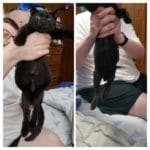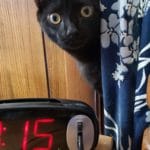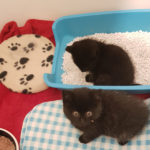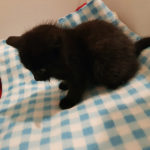Good morning-
When is your next vet appointment? I’m assuming you already have them lined up for vaccinations and check ups since they’re so little. I’m sure the vet will give them all a physical and check for parasites etc. at that time. I think I would try to get in ahead of schedule for this little guy though since your concerned. Best of luck????????
Comments
My kitten of (five weeks – six weeks) appears to have a swollen belly. I have been concerned for a while as it does not seem to go away, my kitten also seems to constipate a bit and isolate himself from other kittens. Although he shows some odd behavior, he still is the most energetic kitten of the lot and eats very often, more so than the other kittens, and he loves climbing, jumping, running, and is an all around happy lil guy. His feces does not seem to show any signs of parasitic infection (no eggs, mucus, blood) and I’m concerned it might even be FIP. Just wondering what it could be, thanks for taking the time in reading this!
Comments
Kitten with completely atonic colon, possible causes? (Long text ahead)
So Nov. 3th in the evening we got 2 kittens, estimated 6 weeks old, thin. However due to being cold outside they already had very thick fur, so it wasn’t visible how thin they were. Weight was 550 & 650gr.
The finder said they have been more active before and only now they were able to get those two. They borrowed to live traps to get the mother and another kitten.
Both were seen eating. They were treated against worms (Milbemycinoxim/Praziquantel) and fleas (Lotilaner)
Nov 4th: Overnight everything was eaten, poo was solid. Kittens were responsive and alert. To the evening only half was eaten. Poo was still solid.
Nov 5th: Nothing was eaten over night, the little one seemed a bit weaker. I started to feed them with a syringe. They started with diarrhea, but that sometimes happens when feeding with a syringe.
Nov. 6th: They still don’t eat by themselves. The smaller one still seemed weaker, but otherwise it seemed fine. A bit diarrhea. In the evening I found it the litter box, not being able to stand, barely reacting. It hat vomited (at least it looked like it), and still had poo stuck on it. It was immediately brought to a vet. It received glucose solution s.c., something against vomiting, pain and an antibiotics. Lung sounded free, heart (ultrasound) was fine, too. A test of parvovirosis came back negative. I took both of them home that night, so I could feed it smaller portions more often and to give more fluids. 2 hours later to was able to stand again. I fed them every 3-4 hours, fluids every 6 (only small amounts obviously). It was lying on a warmth mat. The bigger one was fine, but avoided it’s litter mate.
Nov. 7th: No further improvement. None of them was eating on their own. The smaller one was still lying down most of the time, sleeping, but would react when I came to feed them. It would stand up and walk to the litterbox between the feedings, but the poo had a weird consistency. Not really diarrhea, but veeeery sticky, so it always carried it back to it’s sleeping place. So I had to clean it before every feeding. A test on giardia was positive, treatment started with Carnidazol. Continue to feed them with a Syringe and fluids for the smaller one. Fluids were always absorbed to the next feeding, but it still was a bit dehydrated (skin fold test). The bigger one would play in between and seemed fine otherwise.
Nov. 8th: No changes in the smaller one during the day, still weaker, able to walk, sit and stand, but sleeping most of the time. Today there was rarely poo in the toilet. I assumed that the treatment started working and it was a good sign (although I already had the feeling that something was wrong… wish I would have trusted that feeling). In the evening it seemed weaker, but would still accept being fed with a syringe. It felt different, less body tension, but would still walk away/go to the t. 10pm feeding. More calm, didn’t want to eat that much, peed on me. Meowed louder during giving the fluids than usual and tried to get away. 2am clock, the fluids weren’t absorbed completely, it’s abdomen felt like a sponge. I only fed a tiny amount. 6am weaker, would lie down immediately, breathing was shallow and faster, meowing, I didn’t feed it, fluids still not absorbed. Rushed to the vet.
-> Heart had a low frequency, breathing fast and shallow
-> X-Ray lungs were free, only a tiny amount of fluids in the abdomen, however the complete colon and stomach were filled with food. There was no visible blockage or air.
-> Ultrasound: Absolutely no movement in the colon/stomach, no blockage or air seen either. Kidneys and liver seemed fine
-> Punctation of the abdomen: ca. 3-4ml of fluids, lots of proteins, a bit of blood. Didn’t look like FIP. Possible that the fluids came out of the colon.
It was given something against vomiting, pain, antibiotics, something to help the cardiovascular system and something to get the colon moving again. To help with its breathing got a mask with additional oxygen. However in the next hour it got worse, so we decided to let it go. After it was gone food came back out of it’s mouth. And it didn’t even smell like it had started to digest.
It’s littermate is still with me and fine. It started to eat on its own yesterday.
Now I obviously ask myself what i could have done better/different. By now I think I should have started with additional syringe feeding earlier – at least with the smaller one. And I should have reacted when my feeling told me that something was wrong, even when there were no obvious changes yet. I somehow have the feeling that I sis something wrong and killed it. Did I give too much fluids (but lungs were free and only a bit fluid in the abdomen)? Did I feed too much? Other kittens eat even more without problems – and the other one is fine.
And what can be the causes for the complete stop of movement in the colon/stomach?
I know that FIP can cause this and an ileus (but there were no visible blockage, everything was filled with food), are there other causes? Can giardia do this?
Comments
We just lost one of our cats to FIP. Our surviving cat has not been himself, he won’t even play. He does not appear to have any FIP symptoms. He did lose his appetite for a few days after she passed, but he has since been eating regularly. He is very healthy, he just seems sad and lonely. Will we be able to get him another buddy (Could he get another cat sick now that he’s exposed to FeCV?) and how long should we wait?













thank you SOOO VERY MUCH for helping these cats and sharing their story.
can you tell me where you are located and who helped you with their treatments?
Thanks again!
Krista
Hello,
Thanks so much for your reply. I’m located in Germany at the north coast. There is a group called “Gemeinsam gegen FIP” (translates at “together against FIP”). They have experienced people that help with treatment. So far they helped me with every cat, too.
They have a homepage, too: https://gemeinsamgegenfip.jimdofree.com/
It is a bit chaotic and I don’t think it is avaiable in english, but they have english speaking people. I know they have helped severel cats outside Germany, too.
Shiria